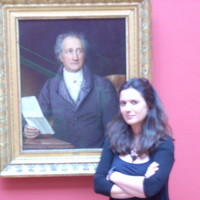Luca Bossi holds a PhD in Social and Political Change from the Universities of Turin and Florence, and a PhD in Science of Religions in co-tutorship with the University of Lausanne. He is a Research fellow at the University of Turin, Department of Cultures, Politics and Society, studying the processes of secularisation and religious transmission among Catholic, Muslim and Orthodox families in Italy. His research focuses on the relationship between public space and cultural and religious diversity, in the frame of migration processes and public policies of inclusion or exclusion. Among his research interests: religious dynamics within the family/at school; minority places of worship, spatial regimes and the right to the city; migrations and social inclusion; politics and policies on religious minorities; urban contexts and the governance of diversity.
Address: Torino, Piemonte, Italy
Address: Torino, Piemonte, Italy
less
Related Authors
luca corchia
Università degli Studi "G. d'Annunzio" Chieti Pescara
ILARIA W . BIANO, PhD
Università degli Studi di Torino
Elena Pontiggia
Accademia di Belle Arti di Brera
Marina Usberti
Università degli Studi di Parma
Milena Anzani
Università degli Studi di Padova
micaela latini
University of Ferrara
InterestsView All (6)










Uploads
Books by Luca Bossi
Papers by Luca Bossi
Minorities and the city. Urban regimes and religious spatial dynamics in Torino
Abstract: Minorities places of worship in Italian and European cities are among the signs of the growing diversification and stratification of religious belongings, rituals and aesthetics. Unprecedented forms of identification bring out new instances of assistance, aggregation and social relations. Especially in urban centers, they find expression and response in religious organizations and their places of worship. More and more, the right to the city of contemporary minorities translates into claim of needs connected to ethnic or religious belonging and to the practices, representations and forms of recognition that derive from them. Thus, the space of ethno-religious minorities-both material and symbolic-can be seen as disputed, contested and conquered.
Minorities and the city. Urban regimes and religious spatial dynamics in Torino
Abstract: Minorities places of worship in Italian and European cities are among the signs of the growing diversification and stratification of religious belongings, rituals and aesthetics. Unprecedented forms of identification bring out new instances of assistance, aggregation and social relations. Especially in urban centers, they find expression and response in religious organizations and their places of worship. More and more, the right to the city of contemporary minorities translates into claim of needs connected to ethnic or religious belonging and to the practices, representations and forms of recognition that derive from them. Thus, the space of ethno-religious minorities-both material and symbolic-can be seen as disputed, contested and conquered.